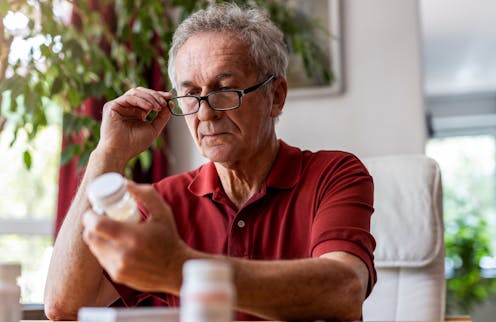Why it’s a bad idea to mix alcohol with some medications
- Written by Nial Wheate, Associate Professor of the School of Pharmacy, University of Sydney

Anyone who has drunk alcohol will be familiar with how easily it can lower your social inhibitions and let you do things you wouldn’t normally do.
But you may not be aware that mixing certain medicines with alcohol can increase the effects and put you at risk.
When you mix alcohol with medicines, whether prescription or over-the-counter, the medicines can increase the effects of the alcohol or the alcohol can increase the side-effects of the drug. Sometimes it can also result in all new side-effects.
Read more: HILDA survey at a glance: 7 charts reveal we're smoking less, taking more drugs and still binge drinking[1]
How alcohol and medicines interact
The chemicals in your brain maintain a delicate balance between excitation and inhibition. Too much excitation can lead to convulsions[2]. Too much inhibition and you will experience effects like sedation and depression.
Alcohol works by increasing the amount of inhibition in the brain. You might recognise this as a sense of relaxation and a lowering of social inhibitions when you’ve had a couple of alcoholic drinks.
With even more alcohol, you will notice you can’t coordinate your muscles as well, you might slur your speech, become dizzy, forget things that have happened, and even fall asleep.
Medications can interact with alcohol to produce different or increased effects[4]. Alcohol can interfere with the way a medicine works in the body, or it can interfere with the way a medicine is absorbed from the stomach. If your medicine has similar side-effects as being drunk, those effects can be compounded[5].
Not all the side-effects need to be alcohol-like. Mixing alcohol with the ADHD medicine ritalin, for example, can increase the drug’s effect on the heart[6], increasing your heart rate and the risk of a heart attack.
Combining alcohol with ibuprofen can lead to a higher risk of stomach upsets and stomach bleeds.
Read more: What's happening to us when we get drunk?[7]
Alcohol can increase the break-down of certain medicines, such as opioids, cannabis, seizures, and even ritalin[8]. This can make the medicine less effective. Alcohol can also alter the pathway of how a medicine is broken down, potentially creating toxic chemicals that can cause serious liver complications. This is a particular problem with paracetamol[9].
At its worst, the consequences of mixing alcohol and medicines can be fatal. Combining a medicine that acts on the brain with alcohol may make driving a car or operating heavy machinery difficult and lead to a serious accident.
Who is at most risk?
The effects of mixing alcohol and medicine are not the same for everyone. Those most at risk of an interaction are older people, women and people with a smaller body size.
Older people do not break down medicines as quickly as younger people, and are often on more than one medication[10].
Older people also are more sensitive to the effects of medications acting on the brain and will experience more side-effects, such as dizziness and falls.
Women and people with smaller body size tend to have a higher blood alcohol concentration when they consume the same amount of alcohol as someone larger. This is because there is less water in their bodies that can mix with the alcohol.
What drugs can’t you mix with alcohol?
You’ll know if you can’t take alcohol because there will be a prominent warning on the box. Your pharmacist should also counsel you on your medicine when you pick up your script.
The most common alcohol-interacting prescription medicines[12] are benzodiazepines (for anxiety, insomnia, or seizures), opioids for pain, antidepressants, antipsychotics, and some antibiotics, like metronidazole and tinidazole.
It’s not just prescription medicines that shouldn’t be mixed with alcohol. Some over-the-counter medicines that you shouldn’t combine with alcohol include medicines for sleeping, travel sickness, cold and flu, allergy, and pain.
Next time you pick up a medicine from your pharmacist or buy one from the local supermarket, check the packaging and ask for advice about whether you can consume alcohol while taking it.
If you do want to drink alcohol while being on medication, discuss it with your doctor or pharmacist first.
Read more: Ten reasons some of us should cut back on alcohol[13]
References
- ^ HILDA survey at a glance: 7 charts reveal we're smoking less, taking more drugs and still binge drinking (theconversation.com)
- ^ convulsions (www.medicalnewstoday.com)
- ^ Jonathan Kemper/Unsplash (unsplash.com)
- ^ produce different or increased effects (awspntest.apa.org)
- ^ effects can be compounded (www.drugs.com)
- ^ increase the drug’s effect on the heart (www.healthline.com)
- ^ What's happening to us when we get drunk? (theconversation.com)
- ^ opioids, cannabis, seizures, and even ritalin (www.sciencedirect.com)
- ^ paracetamol (australianprescriber.tg.org.au)
- ^ more than one medication (www.safetyandquality.gov.au)
- ^ Alfonso Scarpa/Unsplash (unsplash.com)
- ^ alcohol-interacting prescription medicines (adf.org.au)
- ^ Ten reasons some of us should cut back on alcohol (theconversation.com)
Read more https://theconversation.com/why-its-a-bad-idea-to-mix-alcohol-with-some-medications-223293

















